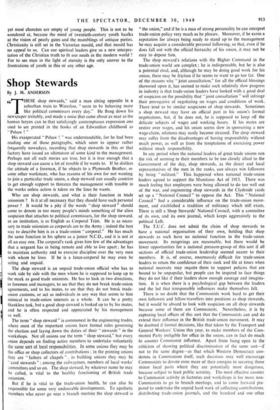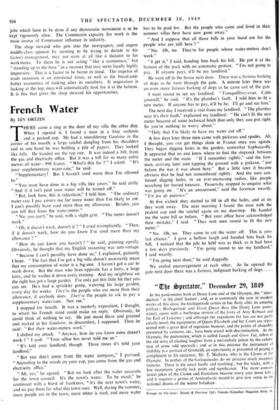Shop Stewards
By J. M. ANDERSON HESE shop stewards," said a man sitting opposite in a suburban train to Waterloo, " seem to be behaving more like political commissars every day." He flung down his newspaper irritably, and made a noise that came about as near as the human larynx can to that satisfyingly contemptuous expression one used to see printed in the books of an Edwardian childhood as " Pshaw ! "
His exasperated " Pshaw ! " was understandable, for he had been reading one of those paragraphs, which seem to appear rather frequently nowadays, recording that shop stewards in this or that factory have issued an ultimatum of some kind to the management. Perhaps not all such stories are true, but it is true enough that a shop steward can cause a lot of trouble if he wants to. If he dislikes the attitude of a foreman, if he objects to a Plymouth Brother, or some other workmate, who has reasons of his own for not wanting to join a particular trade union, a shop steward can usually contrive to get enough support to threaten the management with trouble in the works unless action is taken on the lines he wants.
Who are shop stewards, and what is their function in trade unionism ? Is it at all necessary that they should have such personal power ? It would be a pity if the words " shop steward " should come to denote in too many people's minds something of the- alien suspicion that attaches to political commissars, for the shop steward. as an institution, is as English as Corporal Trim. He is as neces- sary to trade unionism as corporals are to the Army ; indeed the best way to describe him is as a trade-union " corporal." He has much the same function in his sphere as a junior N.C.O., and it is not at all an easy one. The corporal's rank gives him few of the advantages that a sergeant has in being remote and able to live apart ; he has to maintain authority and to exercise discipline over the very men with whom he lives. If he is a lance-corporal he may even be acting and unpaid.
The shop steward is an unpaid trade-union official who has to work side by side with the men whom he is supposed to keep up to the mark as good trade unionists. He has to look in two directions, to foremen and managers, to see that they do not break trade-union agreements, and to his mates, to see that they do not break trade- union customs, or act as individuals in any way that seems to him inimical to trade-union interests as a whole. It can be a pretty thankless task, but a good shop steward is looked up to by his mates, and he is often respected and appreciated by his management as well.
The term " shop steward " is commonest in the engineering trades, where most of the important unions have formal rules governing the election and laying down the duties of their " stewards " in the workshops. Not all unions use the term " shop steward," but every union depends on finding active members to undertake voluntarily the same sort of local responsibilities. In some unions they may be the office or shop collectors of contributions in. the printing unions they are " fathers of chapels " in building unions they may be " card stewards " : among the railwaymen, members of local works' :ommittees and so on. The shop steward, by whatever name he may be called, is vital to the healthy functioning of British trade unionism.
But if he is vital to the trade-union health, he can also be responsible for some very undesirable developments. To apathetic members who never go near a branch meeting the shop steward is " the union," and if he is a man of strong personality he can interpret trade-union policy very much as he pleases. Moreover, if he earns a reputation for always being ready to stand up to the management he may acquire a considerable personal following, so that, even if he does fall out with the official hierarchy of his union, it may not be easy to depose him.
The shop steward's relations with the Higher Command in the trade-union world are complex ; he is indispensable, but he is also a potential rival, and, although he may be doing good work for his union, there may be friction if he seems to want to go too far. One of the reasons why " joint consultation," for all the official blessings showered upon it, has seemed to make such relatively slow progress in industry is that trade-union leaders have looked with a good deal of suspicion on the possibility that " joint consultation " will infringe their prerogative of negotiating on wages and conditions of work. There tend to be similar suspicions of shop stewards. Sometimes a shop steward may have an official part in his union's formal negotiations, but, if he does not, he is supposed to keep off the delicate subjects of wages and working hours. If his mates are restive over wages, and his union seems slow in sponsoring a new wage-claim, relations may easily become strained. The shop steward may suffer from the disadvantages of having responsibility without much power, as well as from the temptations of exercising power without much responsibility.
In any period when the national leaders of great trade unions run the risk of seeming to their members to be too closely allied to the Government .of the day, shop stewards, as the direct and local representatives of the men in the ranks, can always win followers by being " militant." This happened when national trade-union leaders agreed to support the Munitions Act of 1915. There was much feeling that employers were being allowed to do too well out of the war, and engineering shop stewards in the Clydeside yards set up a " National Council " to oppose the Act. This " National Council " had a considerable influence on the trade-union move- ment, and established a tradition of militancy which still exists. There is still a Shop Stewards' National Council, with a committee of its own, and its own journal, which keeps aggressively to the political Left.
The T.U.C. does not admit the claim of shop stewards to have a national organisation of their own, holding that shop stewards as such have no national function in the trade-union movement. Its misgivings are reasonable, but there would be fewer opportunities for a national pressure-group of this sort if all sections of official trade-union leadership seemed nearer to their members. It is, of course, enormously difficult for trade-union leaders to retain the confidence of their rank and file at times when national necessity may require them to support policies that are bound to be unpopular, but people can be inspired to face things they do not like if their leaders show enough courage and imagina- tion. It is when there is a psychological gap between the leaders and the led that irresponsible influences make themselves felt.
There is no doubt that the Communists work hard to get their own followers and fellow-travellers into positions as shop stewards, but it would be absurd to look with suspicion on all shop stewards because some of them are Communists. Nevertheless, it is by capturing local offices of this sort that the Communists can and do extend their influence in the British trade-union movement. It may be doubted if formal decisions, like that taken by the Transport and General Workers' Union this year, to make members of the Com- munist Party ineligible for office in the union, can in fact do much to counter Communist influence. Apart from being open to the criticism of showing political discrimination of the same sort—if not to the same degree—as that which Western Democracy con- demns in Communism itself, such decisions may well encourage Communists to devote even more of their energies to securing those minor local posts where they are potentially most dangerous, because subject to least public scrutiny. The most effective counter to Communist activity in factories and workshops is for more non- Communists to go to branch meetings, and to come forward pre- pared to undertake the unpaid hard work of collecting contributions, distributing trade-union journals. and the hundred and one othet jobs which have to be done if any democratic movement is to be kept vigorously alive. The Communist capacity for work is the main source of Communist influence in industry.
The shop steward who gets into the newspapers, and angers middle-class opinion by seeming to be trying to dictate to his factory-management, may not seem at all like a dictator to his workmates. To them he is not acting " like a commissar," but " standing up to the boss " in a manner that may seem locally highly impressive. This is a factor to be borne in mind. The impetus of trade unionism is an emotional force, as well as the bread-and- butter economics of looking after its members. If inspiration is lacking at the top, men will automatically look for it at the bottom. It is this that gives the shop steward his opportunities.































 Previous page
Previous page